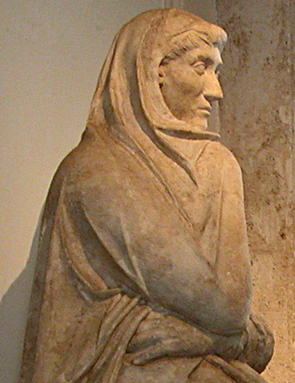 Marble funerary statue: torso, elite woman
Marble funerary statue: torso, elite woman Roman, 1 century BCE (full view)
Pomponia Graecina (?-83 CE) was a noblewoman with connections to the imperial family through her mother Asinia, the daughter of Gaius Asinius Gallus Saloninus and Vipsania Agrippina, daughter of Marcus Vipsanius Agrippa and Pomponia Caecilia Attica. Pomponia's father was probably Gaius Pomponius Graecinus, member of the plebeian gens Pomponia and kinsman of Cicero's friend Titus Pomponius Atticus. Her grandmother Vipsania (see citizen women's names) bore Drusus the Younger (14 BCE-23 CE) to her first husband, Tiberius Claudius Nero, the second emperor of Rome (Julio-Claudian family tree). Pomponia married Aulus Plautius Silvanus, and the couple may have had a son of the same name, who was killed as a young man by Nero for his possible imperial ambitions (Suetonius, Nero 35.4). In 43 CE Pomponia traveled to Britain with her husband, appointed by Claudius to lead the invasion. In the same year, Julia Livia, the daughter of the younger Drusus and Julia Livilla, was executed by order of the emperor Claudius, whose wife Messalina falsely accused her of incest and immorality (Tacitus, Annales 13.43.2; Suetonius, Claudius 29.2; Cassius Dio 60.18.4). Prompted no doubt by her absence at the funeral of her friend and cousin and in silent but visible criticism of imperial injustice, Pomponia, in Tacitus' passage below, sustained mourning dress and manner throughout her lifetime, courageously violating custom (see Paulus, Opinions 1.21.13). At the end of Aulus' term as governor in 47, Pomponia returned with him to Rome where he celebrated an ovatio, a lesser triumph. In 57 CE Pomponia was accused of practicing an unnamed foreign belief (superstitio externa), such as the rites of the Druids, Jews, and Christians, that did not correspond to the traditions of the Roman ancestors (mos maiorum) and did not receive public recognition or integration into state worship. Pomponia could have been one of the first Christians in Britain and among the earliest Christians in Rome. While Claudius as emperor placed few restrictions on foreign religious practices, Nero is accused of persecuting Christians relentlessly, blaming them in 64 CE for the great fire of Rome (Tacitus, Annales 15.44.2-5). Perhaps because of her family connections, Nero invoked early Republican practice by releasing Pomponia to her husband for judgment and punishment (see Livy on the fate of women in the Bacchanalian conspiracy). Her religious insubordination, independent from her husband, and her persistent mourning for her cousin, mentioned by Tacitus in quick succession below, make one wonder if the murder of Julia influenced Pomponia to reject state worship of the emperor and turn to Christianity for solace. While nothing further is heard of Pomponia Graecina, a third century inscription with the name Pomponius Graecinus, located in Rome's Saint Callistius catacombs, has been used to argue that Pomponia was a Christian (DeRossi, Roma Sotterranea II, 360-364). See also Maria Elisa Garcia Barraco (2017), Pomponia Graecina (Rome: Arbor Sapientiae).
XIII.32.2et Pomponia Graecina insignis femina, [A.] Plautio, quem ovasse de
![]() Britannis rettuli, nupta ac superstitionis externae rea, mariti iudicio permissa.
Britannis rettuli, nupta ac superstitionis externae rea, mariti iudicio permissa.
Isque prisco instituto propinquis coram de capite famaque coniugis cognovit et insontem nuntiavit.
![]() XIII.32.2longa huic Pomponiae aetas et continua tristitia fuit. Nam post Iuliam
XIII.32.2longa huic Pomponiae aetas et continua tristitia fuit. Nam post Iuliam ![]() Drusi filiam dolo Messalinae interfectam per quadraginta annos non cultu nisi
Drusi filiam dolo Messalinae interfectam per quadraginta annos non cultu nisi ![]() lugubri, non animo nisi maesto egit; idque illi imperitante Claudio impune, mox ad gloriam vertit.
lugubri, non animo nisi maesto egit; idque illi imperitante Claudio impune, mox ad gloriam vertit.
Click on the underlined words for translation aids and commentary, which will appear in a small window. Click on the icon link![]() to the right of the line for related images and information.
to the right of the line for related images and information.